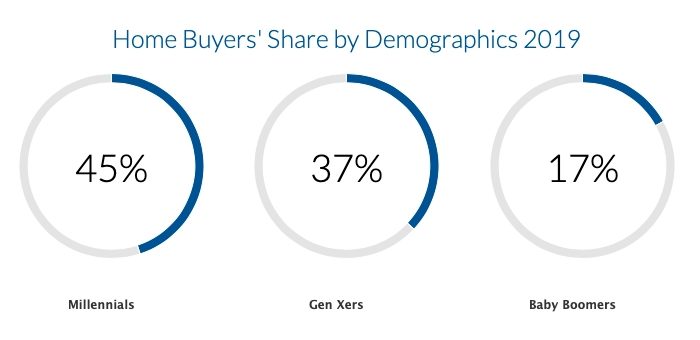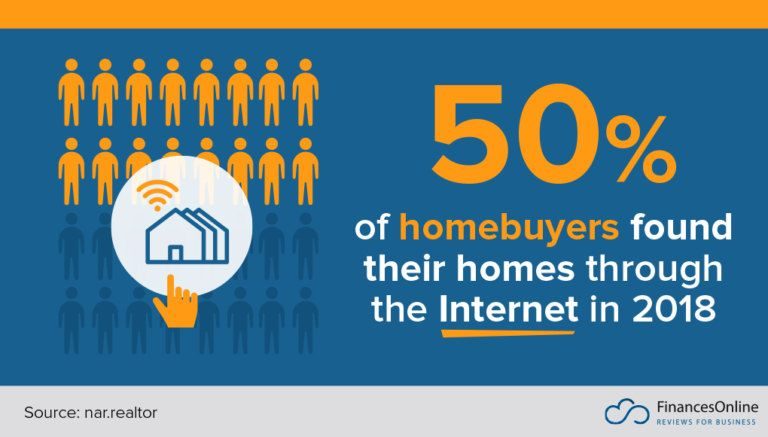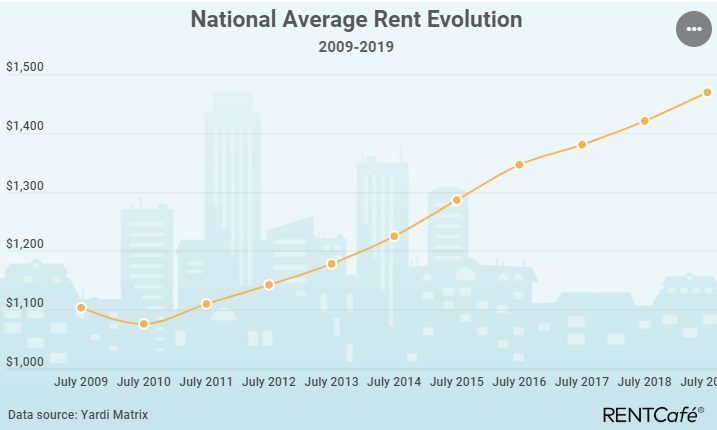For the US real estate sector, 2019 was a tough and controversial year. It was marked by both positive and negative trends. The price of real estate property was increasing tremendously due to different factors such as the imminent economic downturn and some shifts in buyer demographics. Nevertheless, some sectors don’t feel so good about the increase in home prices, which leads to concerns about the upcoming economic climate. In this article, we’ll consider some recent US real estate market trends and outline how custom software solutions can benefit both buyers and sellers.
How Was the US Real Estate Market Doing in 2019
First and foremost, home prices are still rising. Slowly, but they’re rising. In 2019, price growth was about 3.3%. Compare it to 5% in 2018. According to predictions, the overall picture won’t change much in 2020, and home prices will only rise by 2.8%. There still be something to work with, but we won’t see rapid growth that we witnessed in previous years. Such a state of affairs has reduced the number of potential buyers and raise new competitions for those who want to sell their houses for a reasonable price. Since there are fewer offers for their property, the need for the services of an experienced real estate agent will grow. Buyers, in their turn, won’t rush to make investments until they’re entirely sure that this step makes financial sense.
Buyer demographics show some interesting trends. According to statistics, the majority of home buyers are millennials. Folks that were born somewhere between 1980 and 1998 took the lead in 2019 and become the largest group of house buyers.

Image source: Finances Online
Members of this tech-savvy generation that have found stable jobs often in the high-technology field have household incomes reaching $88,200. Most of them prefer middle- and upper-middle-class homes. Millennials are known to research online first before making purchase decisions. To satisfy the needs of such kind of buyers, it’s important to leverage the use of the Internet and make the best possible impression online. More than 80% of them found their home via mobile devices last year. Also, for your concern, approximately 50% of home buyers found their homes online in 2018. Therefore, online presence in 2020 is a must.

Image source: Finances Online
The need for affordable houses is still the thing. Actually, in 2019 in the US house rents beat home purchases by 59%. It’s expected that high home prices will drive demand for rental housing in 2020. Many of those who used to rent houses have purchased their own homes, but the number of those who can’t afford the downpayment is still pretty high. Due to outrageous prices, fees, and borrowing costs, some of them would never buy a house, which means that the rental property market is here to stay. One of the important indicators is the average rent that constantly grew during recent years and is currently equal to $1469 per month.

Image source: Manage Casa
In 2018, more people were renting than owning for the first time ever. That year, home sales were pretty low due to high prices, low availability, and other factors. Since the trend does not subside, 2020 could be a pretty good year for rental property management companies.
Nowadays, the real estate sector feels free to leverage cutting-edge technologies. The adoption and wide use of new tech are expected to continue. Online home selling platforms and apps that make 24/7 smartphone users feel comfortable during their real estate market research are only the tip of the iceberg. Slowly but surely, the blockchain technology is making its way into the real estate market, and some sellers accept bitcoins as a payment. IoT devices provide homeowners with the ability to monitor remotely commercial property in a real-time mode. VR allows creating virtual tours of the house, which helps potential buyers to assess their state without spending time on traveling.
How Custom-made Software Helps to Survive in a Highly Competitive Environment
Continuously rising home prices put all market participants in a pretty tricky position. House sellers face a reduction in the number of potential buyers. The longer they wait for a reasonable price for the property, the less faith they have in their real estate agent. Homebuyers don’t rush to invest and wait for their golden chance, which sooner or later will appear on the horizon. Apartment rental prices in the US keep rising, and the rental housing market, in general, remains quite saturated. As a result, many companies are trying to get a piece of this pie. The competition intensifies, making it pretty hard to attract new customers without learning some new tricks. The possible solution for real estate agencies to make their current clients satisfied and attract the new ones is to automate routine tasks and simplify the whole deal cycle.
Custom-made CRM systems allow you to get full control over your primary resource — your client base. A properly designed CRM app can serve both communication and marketing needs. Such systems provide centralized access to your clients’ contact information and also allow edit, search, and cross-reference it. CRM systems simplify the management of your client’s purchases and sales. This information can be gathered and analyzed in order to provide you with trends in your local market. For example, if clients are interested in middle-class houses in a specific location, the CRM system will inform you about this pattern. Then, in a couple of clicks, you can get access to the list of available houses matching the needs of a majority of current buyers. Taking into account the high competition in the market, you can’t afford yourself to make your clients wait until you prepare a detailed response to their request. CRM helps to respond immediately and with the most actual information.
It’s not enough to know your clients and their needs. To succeed in the market, you have to know the property you’re working with as well. Real estate property management apps help to track property assets, access detailed descriptions of available houses, check tenant histories, and so on. You can create and manage tenant profiles, including contact information, payment history, and rent schedules. A landlord database can, for example, provide complaints on certain tenants, which can help you to protect your clients from undesirable consequences of renting out their houses. Also, such apps can take care of accounting and budgeting, rent payment processing, and document management.
Take a look, XB Software has been featured as one of the Top Real Estate Software Development Company 2020 by DesignRush.
Conclusions
The competition in the real estate market is going to be rough the next year. Growing home prices make home buyers less active, force them to expand search criteria, and discover new, sometimes less attractive options. Reduced number of affordable options doesn’t mean that buyers become less sophisticated in their choice. The representatives of a new generation of tech-savvy investors in the real estate market know what they want and expect their requirements to be met.
The rental property market is still a pretty hot topic. The industry attracts more and more rental agencies, which makes the need for a new competitive advantage an additional competition. Custom-made software solutions for the real estate industry can be the exact solution to the issue. Predictive analytics, for example, implies the extraction of information from existing databases and its further analysis in order to forecast future market trends.
Contact us to get a personalized estimate for your custom real estate system or apply for a free consultation from our experts.